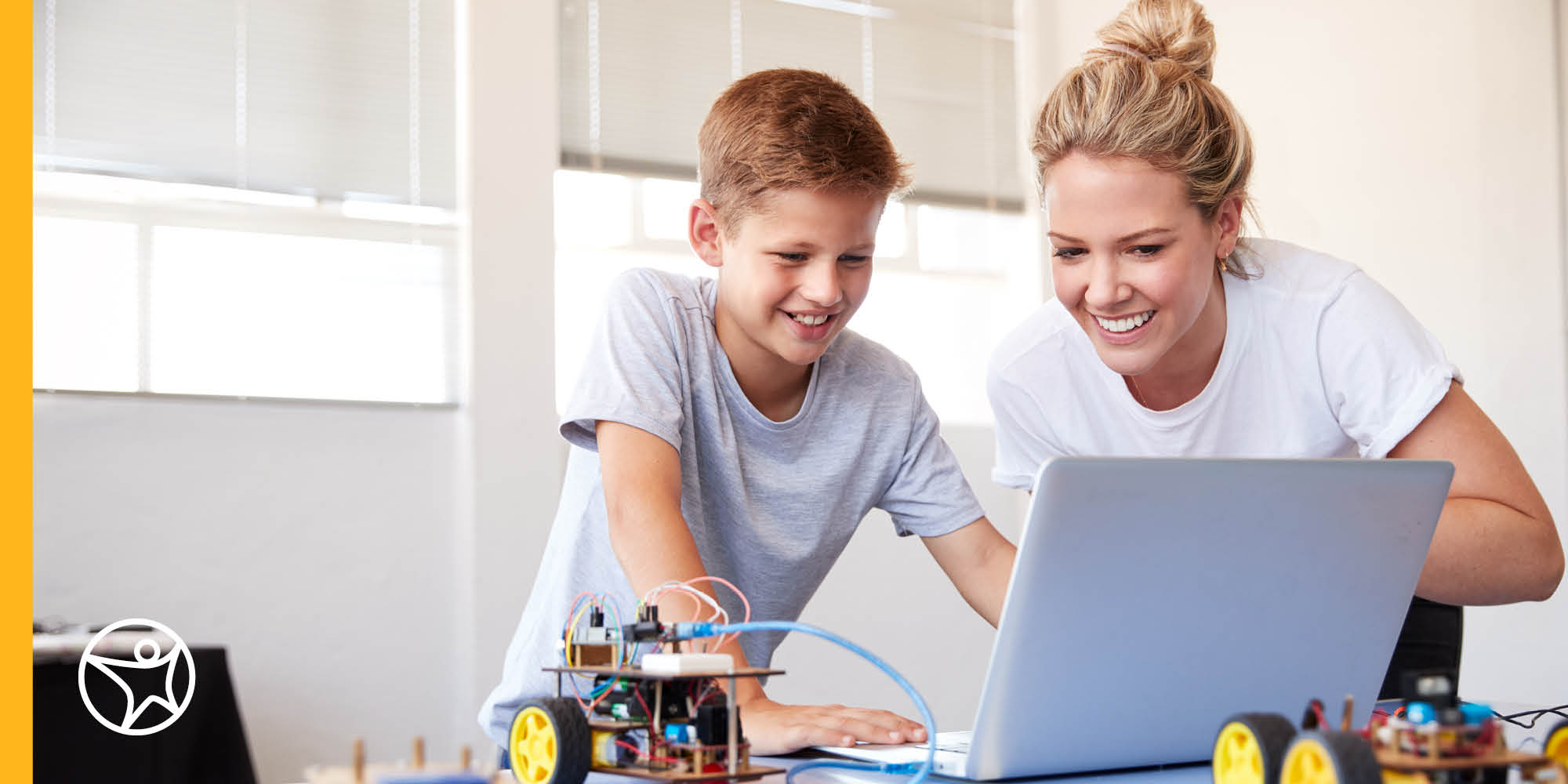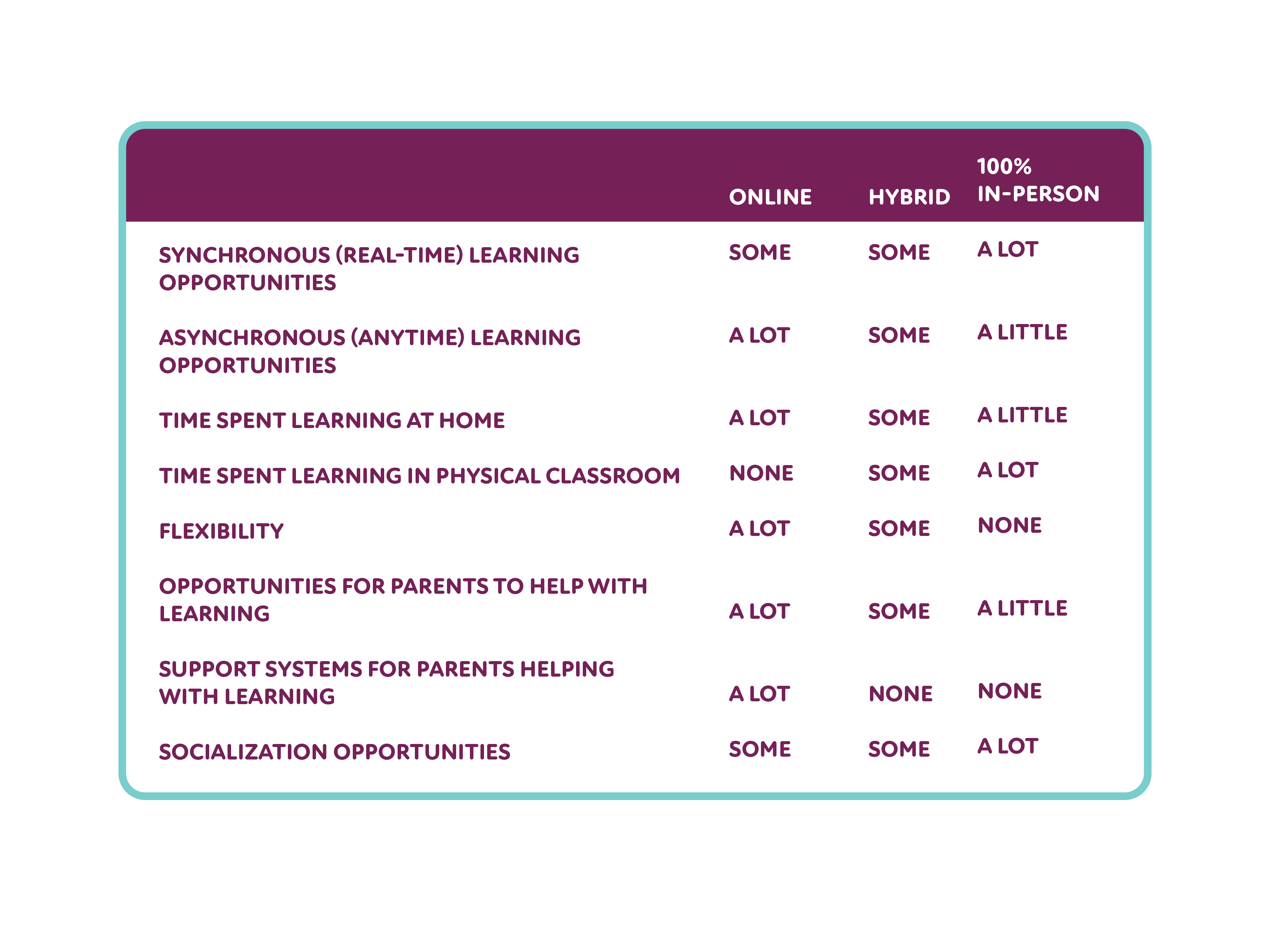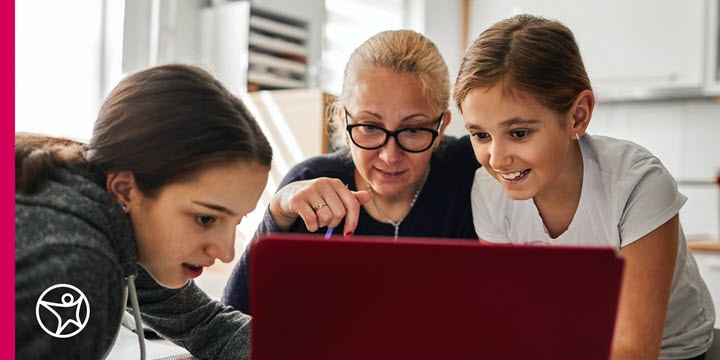Comparison: Hybrid vs. Online School
byConnections Academy
6 min to read
Recent years have brought hybrid learning into the mainstream for millions of families, but the concept has actually been around for several decades. While both hybrid and online school have their pros and cons, it’s important to understand the key differences and similarities of both learning options before making the right decision for your family and your students.
Here’s what you need to know to make your decision:
Quick Answer: Is Hybrid or Online School the Right Fit for Your Family?
Choosing between hybrid and online learning comes down to what your family and your student need.
When Is Online Learning Best?
If your family doesn’t live near your student’s school or has a schedule with frequent interruptions such as medical appointments, or your student needs to break up their day based on how they learn, then the flexibility of online learning might be the best fit.
When Is Hybrid Learning Best?
Hybrid learning is a good fit for those students who need to balance the flexibility of online school with the structure of in-person school. Hybrid schools typically benefit students who need
to take courses not offered by their in-person school or to take specific courses at times during the day that work better for their schedule.

What Is Hybrid Learning?
Hybrid learning, also known as blended learning, combines in-person classroom time with online classroom time.
The in-person classroom time functions in the same way as traditional schools, with set class times and a teacher in the room leading the day’s lesson. Later in the day or at different points during the school year or over summer breaks, students attend classes online with a dedicated virtual schoolteacher, online discussion boards, and assignments they can complete on their schedule.
Hybrid learning helps students who need to take courses not offered by their in-person school, recover course credits to graduate on time, or want to take additional courses that would not ordinarily fit into their in-person schedule.
Hybrid learning helps students develop accountability and responsibility, helping them learn how to manage their time and assignments within a group or as independent learners. It also makes scheduling easier by letting students and their families be flexible about when they go in for class and when they’re learning at home.
What Is Online School?
Online school is a school, also known as virtual school, where a student’s classroom time occurs entirely on their computer through a mix of live and recorded lectures led by dedicated teachers and discussion boards with fellow classmates.
Good online schools are designed by education experts to provide a carefully constructed curriculum and support system that ensures online students have the same opportunities to learn as those attending a physical school.
Side-by-Side Comparison: What Parents Need to Know
Student and Parent Support
Being more involved in your child’s learning can be a great experience—but it’s even better if you’re well-supported by your child’s school.
Since many hybrid learning opportunities are offered by school districts that were originally designed for 100% in-person learning, the level of support they offer varies. In many cases, students and parents have to rely on individual teachers to reach out and provide guidance, as the school has no established support system for remote learning.
This is not the case at a good online school. For example, Connections Academy provides a robust system of support for both parents and students. Parents at Connections Academy can turn to all kinds of resources designed to ensure they are effective Learning Coaches. And the school’s teachers, staff, and counselors are trained in identifying any struggles online students may be having and working with them directly to overcome obstacles.
Hybrid learning environments and online schools share a lot of benefits. As hybrid learning opportunities wane, an online school can be an excellent alternative for students and parents who prefer the flexibility, parental involvement, and other advantages that traditional, in-person schools don’t offer.
To learn more about what it’s like to send your child to an online school, check out our article, “5 Sample Online School Schedules for Families."

While hybrid and online learning share some commonalities, it is important to understand the day-to-day impact each may have on your student and your family.
Learning Style
Online schools blend real-time and anytime learning, allowing students to complete their work from home or from anywhere else they want or need to be.
Since hybrid learning utilizes in-person classrooms and online environments, students need to be able to effectively learn in both modes.
Flexibility
Both hybrid learning and online schools offer flexibility, but the difference lies in how much; because hybrid learning still requires in-person class time, students in a hybrid learning environment have less control over their daily or weekly schedule than students fully enrolled in online school.
Online school students, on the other hand, often have the ability to plan their day or week around their personal needs.
Student and Family Support
Since many hybrid learning programs are offered by school districts that were originally designed for in-person learning, the level of support they offer for students and their families can vary.
In hybrid and online schools, like Connections Academy® for example, students and parents both benefit from a robust system of support and resources, and the school’s teachers, staff, and counselors are trained in identifying any struggles online students may be having and working with them directly to overcome obstacles.
Your Role as a Parent: What to Expect
Your role as a parent in hybrid vs. online school will change slightly depending on which avenue you choose.
Hybrid Parental Involvement
Parents of hybrid learners have the opportunity to be more involved in their child’s learning than they would if they only attended in-person school. Being available for project help, navigating complex schedules, or answering questions that their student might be too shy to ask in class are just a few ways parents take an active role in their child’s education on the days that they’re home.
Online Parental Involvement
Parents of online learners take on an even bigger role in their education. Not only are they their student’s primary source of additional support as they learn primarily from their teacher, they are also the person who troubleshoots technology when it malfunctions, keeps them on track and focused while they learn at home, and helps them stay motivated throughout the school year.

The Social Question: How Kids Connect
One of the biggest concerns some parents have with online learning is whether or not their child will get enough socialization and have the opportunity to make friends. No matter how you choose to structure your child’s education, social contact with peers is essential.
Socialization in Hybrid Learning
In a hybrid learning environment, students spend time in physical classrooms with their peers, though not as frequently as if they attended school 100% in-person. However, like in-person students, hybrid learners can also participate in afterschool programs, clubs, or sports, ensuring they have plenty of opportunities to socialize and develop their social skills.
Socialization in Online Learning
While there are no physical classrooms for online school students, there are still opportunities to socialize with their peers. Families who have students enrolled online might consider joining a learning pod with other virtual or homeschooling families, which can build in socialization time and academic support throughout the year. Students can also join virtual clubs, where they can meet other people who share their interests and spend time hanging out online with peers from around their state and, in some instances, around the nation. People who share their interests and spend time hanging out online with peers from around their state and, in some instances, around the nation.
Some online schools, like Connections Academy, offer in-person field trips where students can meet peers from their area and spend time exploring the world together. Both hybrid and online students can benefit from volunteering as well, which can help them develop important social skills like teamwork and empathy, and help them start to grow their values.
Making Your Decision: Questions to Ask
So you know the difference between hybrid and online learning—now which one is best for your child? You might start by asking yourself some questions that get to the root of what kind of learning best suits your needs.
- How does my child like to interact with technology?
How much time can I dedicate to supporting my child’s education at home?
How are classes taught? What kind of training do the teachers have?
How is technology like artificial intelligence managed in class or for homework?
How is student progress tracked, and what steps are taken to close gaps if needed?
- Can my child handle learning independently, or do they need more structure and assistance?
What is the family schedule like?
How much flexibility do we need?
What social activities or opportunities are available to them?
Does my child require learning accommodations?
What are student and parent support resources like?
Ready to Try Online School?
Connections Academy is a tuition-free, online public school with more than 20 years as a K–12 online school. Backed by certified teachers trained in online education, we offer a flexible curriculum and can create individualized learning plans for every student, focusing on the student’s strengths, challenges, and goals for school and their future. Read success stories and download our free eGuide to learn more.



